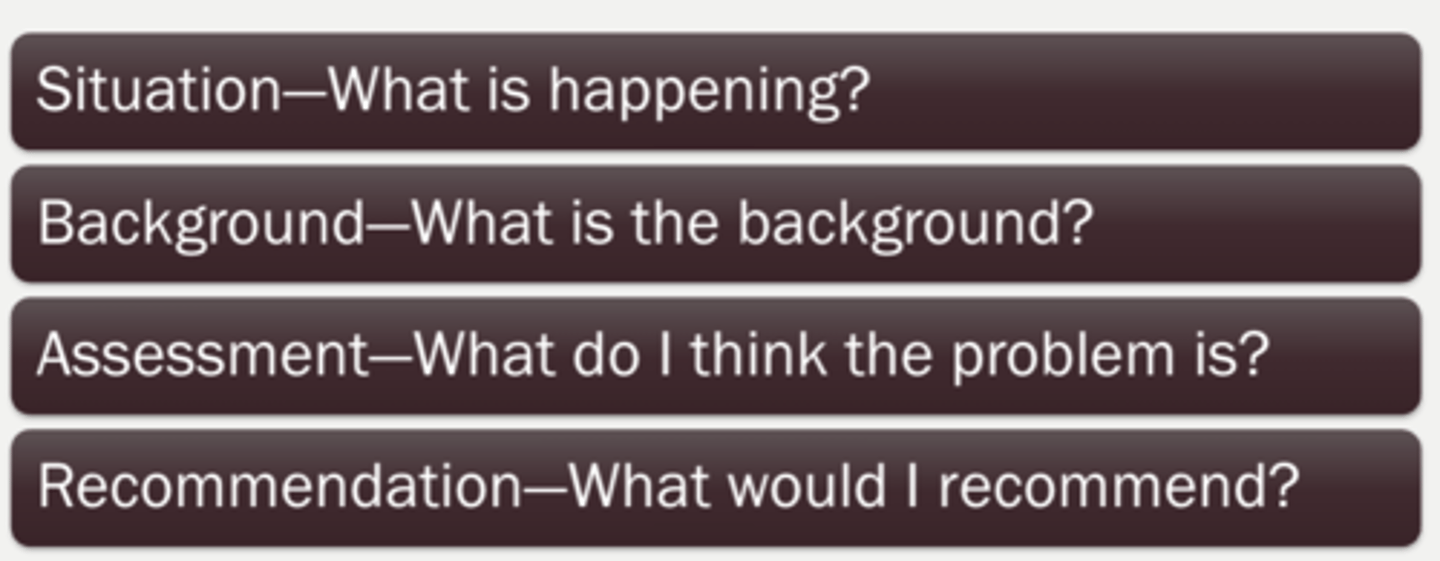Exam 3: Communicating with Healthcare Providers
1/31
There's no tags or description
Looks like no tags are added yet.
Name | Mastery | Learn | Test | Matching | Spaced | Call with Kai |
|---|
No analytics yet
Send a link to your students to track their progress
32 Terms
_____________________ is the lifeline of a well-functioning team
communication
Improving the quality of information exchange decreases.....
communication-related errors
- Ineffective communication was identified as the root cause of 66% of reported errors
Example of a tool for effective communication across teams
- TeamSTEPPS
Effective communication in the healthcare setting is: (4)
- Complete
- Brief
- Clear
- Timely
Complete communication
- Communicate all relevant information
- Allow for time for questions to be asked
Brief communication
- be concise
Clear communication
- Use information that is plainly understood
- Use common or standard terminology
Timely communication
- Occurs at appropriate intervals
- Avoid delays in relaying important information
What should be done before making a recommendation or contacting a provider?
- Do your ______________________ first
- hypothesize the ________________ for why the situation occurred
- Is ___________________ needed?
- Weigh possible _______________ and have a few __________________
- Consider _____________________ are communicating with
- Knowing ____________________ helps frame your recommendation
- What will they _______/_________ to know?
- ___________________ of provider
- Differences in ____________________________
Do your homework first
- hypothesize the reasons for why the situation occurred
- Is additional info. needed? (additional subjective or objective data)
- Weigh possible solutions and have a few alternatives (what is strength of evidence? How might your recommendation change?
- Consider who we are communicating with
- Knowing your audience helps frame your recommendation
- What will they know/want to know?
- Personality of provider
- Differences in communication styles
Choose an appropriate _________________
appropriate time
- what is the level of urgency?
- determine if this is a good time to speak
Methods of delivery? (3)
- Written
- Verbal- these recommendations should still be documented in the pts record
- Electronic
When delivering the message be ______________, ___________________, _______________, ____________________ AND ____________, __________________
- clear
- complete
- concise
- timely
- professional
- organized
Introduction:
- Greet the provider by their __________________
- Always use a __________________ if a 3rd party is present
- Identify ______________ and your ________
- catch their ________________ and note ____________
- preferred method
- formal greeting (eg., Doctor)
- yourself and your role
- attention and note urgency
Delivering the message: Provide the _______________ and offer __________ to support the recommendation
rational and offer evidence
- be sure to note the difference between what is published evidence/guidelines vs. your clinical opinion
Delivering the message: Develop rapport while delivering the message:
- watch your ____________ tone, ______ language
- be _______, ______________, ______________
- be _____ful
- be ____________________ but do not overstate the case for change
- avoid _____________ mannerisms
- revise delivery according to _________ and _____________________ of the provider
- watch your terminology tone, body language
- be calm, respectful, assertive (not aggressive)
- be tactful
- be persuasive but do not overstate the case for change
- avoid nervous mannerisms
- revise delivery according to cues and body language of the provider
Delivering the message: Be prepared to _________________ the recommendation based on _______________ or ___________ from the provider
- modify
- new information
- challenges
- Answer _____________ and offer further ________________
- Elaborate on ________________
- Collaborate to identify the best ____________________
- questions; information
- justification
- alternative
Sometimes, the best solutions are a result of....
cooperation between the pharmacist and provider
If recommendation is party accepted or rejected, advise on what?
on whether further or more frequent monitoring might be necessary to avoid future problems
Closure:
- Use the ___________________ technique
- Offer to provide _________________________ or to do further information search
- __________________ for their time
- check-back technique-repeat the change in plan or new orders resulting from communication
- additional information
- thank the provider
SBAR (many use iSBAR, the "i" for identify yourself)
- Situation—What is happening?
- Background—What is the background?
- Assessment—What do I think the problem is?
- Recommendation—What would I recommend?

What does SBAR provide?
What is it useful for?
a standardized framework for members of the healthcare team to communicate
- easy-to-remember, concrete mechanism
- useful for framing any conversation
SBAR is especially useful for critical conversation requiring.....
a clinician's immediate attention and action
What does SBAR provde members of the team with?
an easy and focused way to set expectations for what will be communicated and how
When recommendations are rejected, what should be documented? (3)
- Initial recommendation made
- Provider's decision
- Brief rationale for their decision
If concerned about the plan, propose ____________________ to limit the potential for adverse outcomes
compromises
When recommendations are rejected, _______________________ concerns about safety
assertively communicate
AHRQ TeamSTEPPS program-CUS statements to say when recommendations are rejected
• C: I am concerned...
• U: I am uncomfortable...
• S: This is a safety issue...
Dealing with anger, frustration, irritation:
- stay ________ and _________________
- reflect back the __________________
- keep the focus on _________________________
- accept __________________
- respect ____________________ authority
- offer to pass ____________________ on to those in authority
- stay calm and assertive
- reflect back the emotion (so you are feeling frustrated because..)
- keep the focus on what is best for the pt
- accept alternative viewpoints
- respect decision-making authority
- offer to pass concerns on to those in authority
What is the importance of communication? (2)
- Critical for team functioning
- Breakdowns in communication can impact patient safety
Strategies for effective communication with healthcare providers: (2)
- Prepare in advance
- Delivering the message in an effective way involves several considerations for introducing the problem, identifying solutions, developing rapport
Identify and utilize tools to promote effective communication w/healthcare providers:
- SBAR
- Check-back technique
- CUS statements